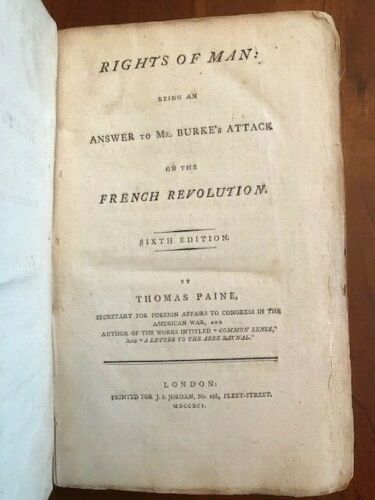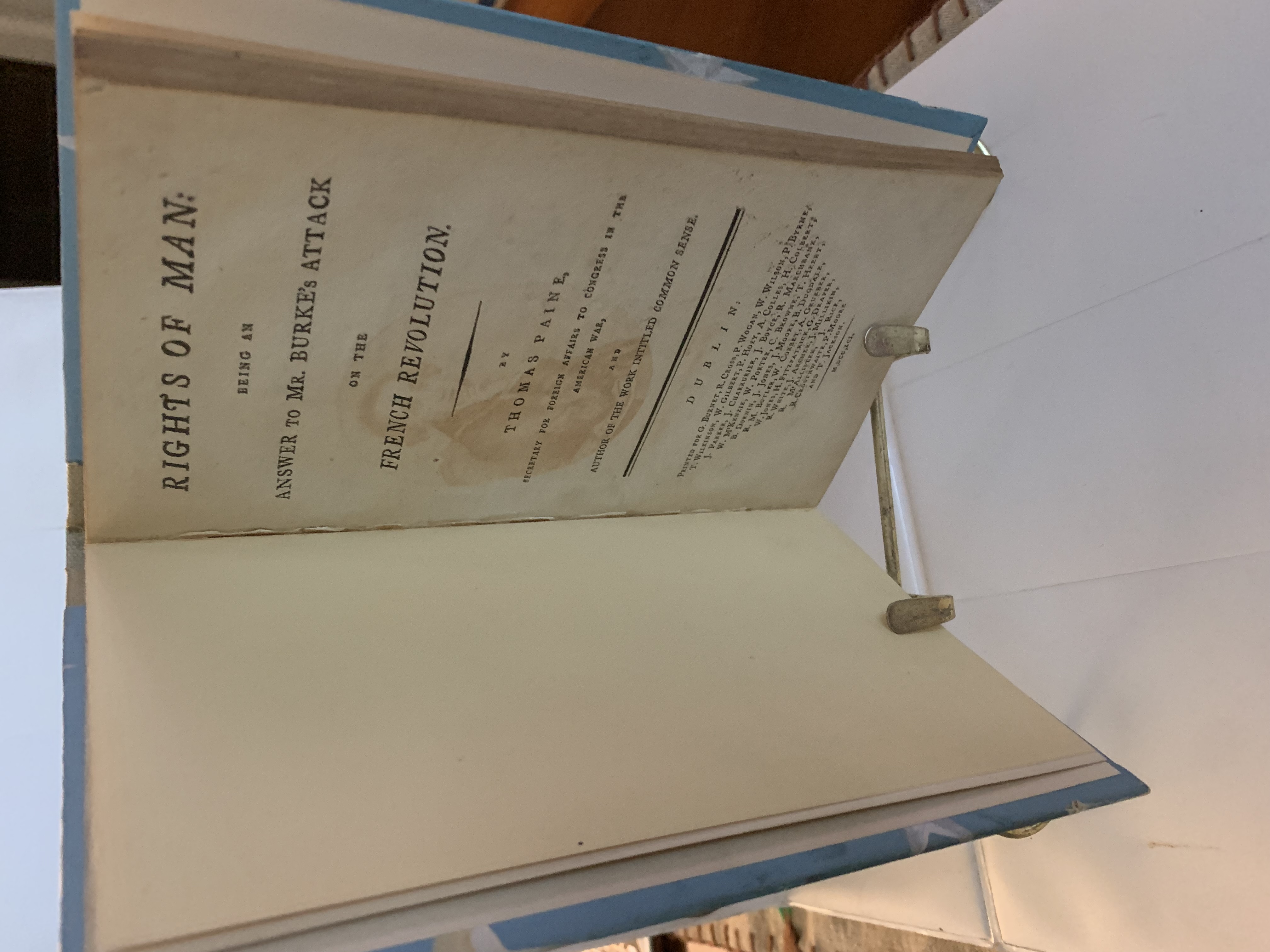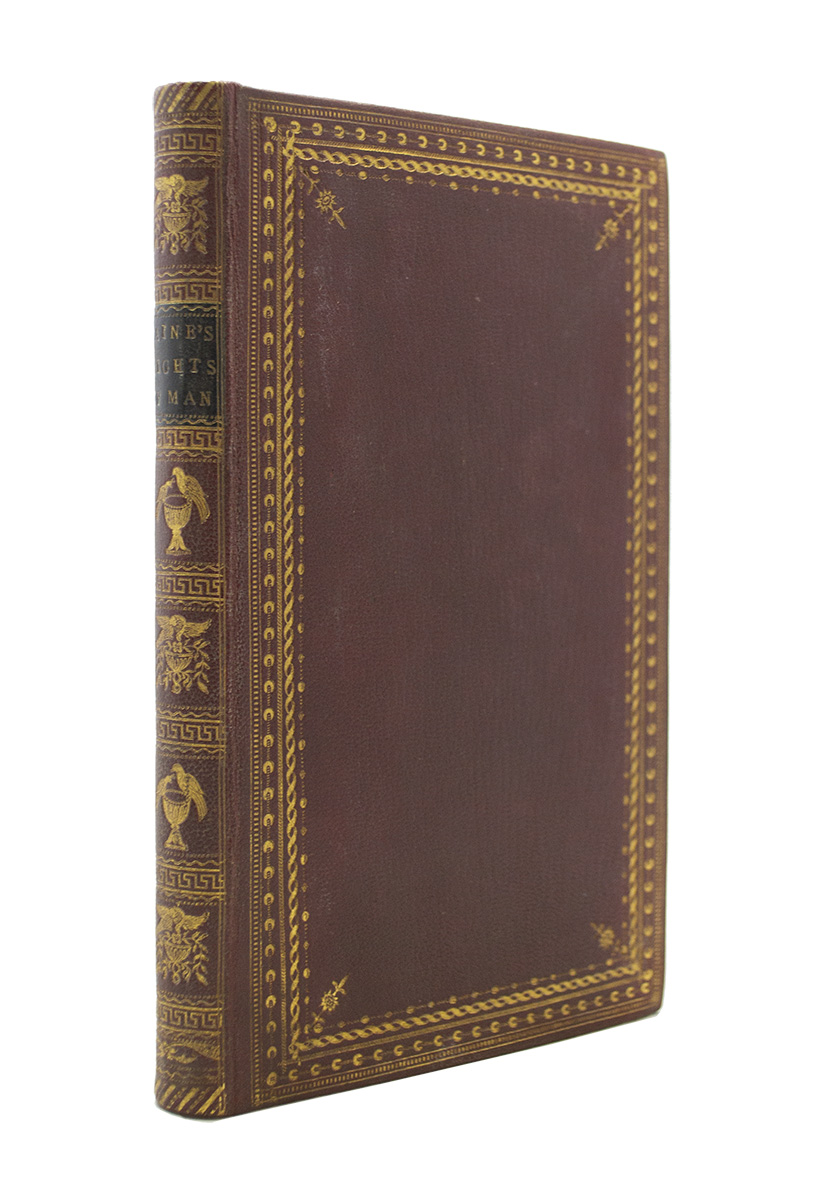Available Copies from Independent Booksellers

Price: US$1250.00 + shipping
Description: 171, [1] pages. Hardcover bound in original boards. Both covers detached, and the binding is not holding together well with gatherings separating. Originally with a paper-covered spine, but the paper has completely chipped away. The sewing on the spine is broken. There are three remaining bands (likely of seven) at the top portion of the spine. and these bands are not secure, so the gatherings are easily falling apart. Complete with the Half Title (noting the price was Three Shillings). Original pamphlet stab holes seen in the gutter. The rear cover has been heavily damped, and there is evidence of old damping as well as mildew stains, mostly towards the rear and in the gutter and bottom edge. A later piece of paper has been placed loosely in between pages 110-111, resulting in browning at the gutter at the top, affecting the letters near the gutter of the first few lines. We grade this in Fair to Poor condition. The verso of the rear leaf advertises as "Just Published" Paine's "Common Sense" (a New Edition) and "A Letter to the Abbe Raynal, on the Affairs of North America" (a New Edition). The Dedication page reads, "To George Washington, President of the United States / Sir, I Present you a small Treatise in defence of those Principles of Freedom which your exemplary Virtue hath so eminently contributed to establish. --That the Rights of Man may become as universal as your Benevolence can wish, and that you may enjoy the Happiness of seeing the New World regenerate the Old, is the Prayer of / Sir, Your much obliged, and Obedient humble Servant, / Thomas Paine."
Seller: Jim Crotts Rare Books, LLC, Clemmons, NC, U.S.A.

Price: US$1260.00 + shipping
Condition: Fine
Description: Thomas Paine, Rights of Man: Being an Answer to Mr. Burke s Attack on the French Revolution, Dublin: G. Burnet, et al., 1791. This iteration is the first Dublin edition of Paine s response to Burke printed at the behest and expense of a large group in the year that Rights of Man was published. Only Part I. Part II came out in 1792. Before the French Revolution went awry and literally almost took his head, Paine wrote The Rights of Man, his seminal work of political discourse wherein he both showed the weaknesses and absurdity of monarchy, defended individual rights of liberty and conscience, embraced representative government as the best form of government, and contended for the creation of what is now known as the welfare state. As the author of Common Sense (1776), Rights of Man (1791, 1792), Age of Reason (1794), and The [American] Crisis (1776-1783), Paine was far ahead of his times as a political and economic thinker and essayist. Having left school at 12, Thomas Paine, the son of a corset maker trained to take-up that occupation, revealed no genius as he went from job to job. But on January 10, 1776, a month before he turned 39, Paine exploded onto the transatlantic stage as the foremost advocate of obtaining liberty for the colonies by fighting the British. Paine himself commented that any literary talent he might have had was buried in me and might ever have continued so, had not the necessity of the times dragged and driven him to write. (The Crisis, No. VIII, ¶6.) This volume has a modern hardback binding decorated with a few stars on a blue field. The cover page features a faint image of Paine behind the printed words. All pages are intact and in fine shape. The only writing observed is a note inside the front which in pencil reads, Rear Dublin Edition Published same year as the American edition (1791).
Seller: Paines Pen, Guerneville, CA, U.S.A.

Price: US$3000.00 + shipping
Description: First French edition of Thomas Paine's classic statement of faith in democracy and egalitarianism. Octavo, bound in contemporary one quarter calf over marbled boards. In very good condition. From the library of Virginia bibliophile and historian Christopher Clark Geest with his bookplate to the pastedown. Rare and desirable. "One of the most remarkable political writers of the modern world Thomas Paine wrote both parts of Rights of Man with the United States in mind Celebrating America and the extension of the struggle for liberty, equality and democracy to France Rights of Man became a phenomenal success in America" (Kaye, 4, 97-9). Paine finished the first part of Rights of Man on his 54th birthday, January 29, 1791, and the following day handed the manuscript to Johnson, a London publisher "who set about printing it in time for the opening of Parliament and Washington s birthday on February 22." Fearing governmental reprisals, Johnson halted its release compelling Paine to find another London publisher J.S. Jordan. Paine entrusted friends to supervise the publication and "packed his trunk for Paris, where he planned to arrange a French translation." The London edition of Rights of Man finally saw publication on March 13, 1791 and "made Paine the most controversial public figure of the day" (Keane, 304-6). Paine, then in France, had "brought with him from London a copy of the [original sheets] for translation into French" (Woodward, 199). With the publication of a new French edition of Common Sense and, in May 1791, the appearance Droits de l Homme [Rights of Man], French newspapers declared Paine "the most determined champion of republican principles." Paine's objective in Part I of Rights of Man "was to defend the cause of individual rights and liberty" (Fruchtman, 250-1). Rights of Man stands as "the earliest complete statement of republican principles. It set forth the fundamental ideas on which the American republic was founded" (Woodward, 211). Shortly after publication of Part I of Rights of Man, Paine began work on Part II, which appeared in February 1792.
Seller: Raptis Rare Books, Palm Beach, FL, U.S.A.

Price: US$6500.00 + shipping
Condition: Good
Description: Reunissant les Principes et la Pratique. 2 volumes. 8vo, modern 3/4 blue cloth with marbled boards and red morocco spine labels, cloth lightly soiled on both volumes, corners lightly bumped on volume II, scattered light foxing in both volumes, mostly to margins, pp. 179-224 of volume II with thin dampstaining to upper right margins, contemporary ownership signature on margin of title-page of volume I. Paris: Chez F. Buisson, 1791, 1792. First Editions in French. Volume one of this set was printed in May, 1791, three months after the first edition was printed in London. That first edition was immediately suppressed and most of the copies were destroyed. Later London editions were edited and controversial parts of the original text were omitted. This French translation has the complete original text of the suppressed first edition and was not edited. Volume one contains a new preface by Thomas Paine, specifically for this French edition. "Government exists, Paine said, to quarantee to the individual that portion of his natural rights of which unaided he could not ensure himself. These rights, with respect to which all men are equal, are liberty, property, security, and resistance to oppression.Part II contains.numerous proposals for social legislation which show that Paine was not unaware of the class struggle. . (The Rights of Man) was suppressed by Pitt's government, and its author, safe for the moment in France, was tried for treason and outlawed in December, 1792." Dictionary of American Biography XIV, pages 161-162. Complete pagination in both volumes including half-title pages. Howes P-31. Printing and the Mind of Man 241.
Seller: Argosy Book Store, ABAA, ILAB, New York, NY, U.S.A.

PAINE Thomas. Rights of Man. BOUND WITH: Rights of Man. Part the Second.. , 1791.
Price: US$12500.00 + shipping
Description: "PAINE, Thomas. Rights of Man: Being an Answer to Mr. Burke's Attack on the French Revolution. Fourth Edition. BOUND WITH: Rights of Man. Part the Second. Combining Principle and Practice. The Second Edition. London: Printed for J.S. Jordan, 1791, 1792. Octavo, 19th-century three-quarter calf, marbled boards; pp. [iii-vii], viii-x, [7]-171, [2]; [i-v], vi, [vii], viii-xv, [xvi], [1], 2-174, [175], 176-178. $12,500.Rare fourth edition of Part I and second edition of Part II of Rights of Man, each published shortly after the first editions by J.S. Jordan, who published Part I after the original edition was suppressed and was arrested for publishing Part II. One of Paines most important, influential, and bestselling works, Rights of Man resulted in the prosecution in England of Paine, his publishers, and booksellers, forcing Paine to flee to France.Hoping Rights of Man "would do for England what his Common Sense had done for America," Paine answered Edmund Burke's attack on the French Revolution with his "celebrated answer, The Rights of Man" (Gimbel-Yale 59). Written "with a force and clarity unequalled even by Burke, Paine laid down those principles of fundamental human rights which must stand, no matter what excesses are committed to obtain them The government tried to suppress it, but it circulated the more briskly [Rights of Man is] the textbook of radical thought and the clearest of all expositions of the basic principles of democracy" (PMM 241). In this revolutionary work, "Paine's attack on monarchy went farther than he had attempted on Common Sense or the Crisis series Rights of Man was one of the most ardent and clear defenses of human rights, liberty and equality in any language Like Locke, Paine wrote that people have rights naturally, and as they joined together to form society and then government, they transformed a number of their natural rights into civil rights Rights of free speech, opinion, conscience, association (in America those rights became embodied in the first amendment to the Constitution in the same year the first part of the Rights of Man appeared) were all part of the natural rights which a properly constituted government must protect" (Fruchtman, 225).Paine's friends, Franklin, Jefferson, Washington and other Founding Fathers, it was Jefferson, in particular, who "evidently appreciated what America owed Paine and surely sensed how Paine's thinking had shaped his own. It was not only the Declaration of Independence that reflected Paine's influence. Jefferson's later work did as well Jefferson understood how much the Republican movement had depended on Paine's pen and the diverse folk inspired by it. In the spring of 1791 Jefferson had hailed the first part of Rights of Man" (Kaye, 92). In early 1792, when Paine sent him a first edition of Part the Second, Jefferson responded by writing a letter to Paine in praise. In it, Jefferson spoke of his distress at the rise in America of some who were "panting after an English constitution itching for crowns, coronets & mitres, but our people, my good friend, are firm and unanimous in their principles of republicanism, & there is no better proof of that than they love what you write and read it with delight go on then doing with your pen what in other times was done with the sword; shew [sic] that reformation is more practicable by operating on the mind than on the body of man, and be assured that it has not a more sincere votary, nor you're a more ardent well-wisher than, Dear Sir Your friend & svt Th: Jefferson" (Sowerby 2826). Part I of Rights of Man was dedicated to George Washington and the first edition was to be published on his birthday, February 22, 1791, but publisher Joseph Johnson suppressed it because of intimidation by government agents. "Fearing the book police, and unnerved by the prospect of arrest and bankruptcy, Johnson suppressed the book on the very day of its scheduled publication. Alarmed by the prospect that the work would be stillborn, Paine reacted fast. He agreed to a deal with another publisher, J.S. Jordan on Fleet Street, and with the help of friends and a horse and cart delivered to him Johnson's printed, unbound sheets. Paine scurried around for the money to pay for the work He then packed his trunk for Paris" (Keane, 304-5). Jordan took Johnson's unbound sheets of text and added a new title page with Jordan's imprint and a preface that Paine sent him from Paris. Jordan published his edition (the first edition, second issue) on March 16, 1791, and it sold out in hours. "Curiosity and word-of-mouth advertising kept sales brisk. Jordan had set a new edition in type [the stated "second edition," with changes to the text and different pagination] and had it on the market three days after the first appeared. It sold out within a few hours" (Hawke, 223-4). "The book was a sensation, and at least eight editions were published by Jordan during 1791" (Gimbel-Yale 60). Rights of Man, Part the Second, was first published on February 16, 1792, also by Jordan. "Jordan's press continued to work around the clock, and within the next two weeks another four printings came off the press. The brightest and most powerful political skyrocket in English history had been launched" (Keane, 327). "Not even Paine could have imagined that Rights of Man was destined to become one of the best-selling books in the history of publishing [it] broke every extant publishing record" (Grogan, 18)."While the first part of The Rights of Man was relatively mild Part the Second fully developed his great political philosophy" (Gimbel-Yale 66). The British government considered prosecuting Paine for sedition shortly after the publication of Part I, but decided against it at the time because "Paine had tempered argument and language so skillfully that it would be hard to make a charge of sedition stick in court. To prosecute would provide free advertising" (Hawke, 223-4). But in 1792, after the publication of the more
Seller: Bauman Rare Books, Philadelphia, PA, U.S.A.

Price: US$14500.00 + shipping
Description: Being an Answer to Mr. Burke's Attack on the French Revolution. Second Edition. [First American]. Philadelphia: Re-Printed by Samuel Harrison Smith, 1791. [Together with] PAINE, Thomas. Rights of Man. Part the Second. Combining Principles and Practice. Second Philadelphia edition. Philadelphia: Printed by and For Messrs. Printed by and for Messr. H. and P. Rice, no. 50, Market-Street, and S.H. Smith, 1792. First American Edition of part one of Thomas Paine's famous work, Rights of Man, printed the same year as the first London edition. Second American edition, printed the same year as the first American of part two. Misunderstandings of which edition Part one is are common as the title-page states Second edition, although it is the first printing in America. "The full title of the first American printing, designated on the title-page as the 'Second Edition, reads Rights of Man. Being an Answer to Mr. Burke's Attack on the French Revolution, by Thomas Paine, Secretary for Foreign Affairs to Congress in the American War and author of the work intitled Common Sense. Philadelphia: Re-printed by Samuel Harrison Smith. M.DCC.XCI. While TJ ordered three or four copies of this edition, none owned by him is known to exist. See Sowerby, No. 2826." ("Editorial Note: Rights of Man: The "Contest of Burke and Paine . in America" Founders Online, National Archives). It is our assumption that because Smith was a relatively new printer, he printed "Second Edition" on the title-page as this was it's second time being printed, even thought it was the first time it was printed in America. The second American edition states "Second Philadelphia edition, from fourth London edition, corrected and enlarged" and contains one less page. Octavo (8 1/8 x 4 7/8 inches; 206 x 123 mm). [1]-105, [1, blank]; viii,[1],10-96 pp. Part one is dedicated to George Washington as in Jordan's London editions and part two is dedicated to the Marquis de Lafayette. The last true first London edition to sell at auction (one of just about 100 copies that were sold before the run was recalled hours after release) which was a 1st edition of part one and a 2nd edition of part two, sold for $250,000. Here we have the first American first edition of part one. We could find no other copy besides this current copy at auction since 1911. Two volumes bound together in full maroon morocco. Boards and spine elaborately tooled in gilt. Spine with black morocco spine label, lettered in gilt. All edges speckled red. Text block of part one with some minor toning and part two with some mild spotting as expected of American paper from this time. Minor corner stain to outer lower corner on pages 97-106. Overall a very good copy of both parts. About 4 weeks after Jordan's London edition was printed, a few copies arrived in Pennsylvania and one such copy landed in the hands of Thomas Jefferson by way of James Madison who had received it from John Beckley whom has initiated arrangements for publication in Philadelphia. Beckley requested Jefferson return the copy to J.B. Smith (the printer's father) when he had finished reading it. There was a bit of confusion to Jefferson as to the identity of JB Smith, thinking instead he was the printer's brother and therefore a stranger to Jefferson. Jefferson dashed off a note to accompany the book back to Smith and upon receipt of the published pamphlet just days later, Jefferson was "thunderstruck" to see excerpts from his note printed in the publisher's preface. Samuel Smith quoted Jefferson who stated "I am extremely pleased to find it will be reprinted here, and that something is at length to be publicly said against the political heresies which have sprung up among us. I have no doubt our citizens will rally a second time round the standard of Common Sense." Smith did not name Jefferson but rather identified him as Secretary of State. "In identifying the Secretary of State as the one who had transmitted 'a copy of this Pamphlet for republication' and omitting the explanation that this had been done at Beckley's desire, Smith permitted his readers the plausible inference that it was Jefferson who had sponsored publication of the pamphlet." ("Editorial Note: Rights of Man: The "Contest of Burke and Paine . in America" Founders Online, National Archives). Jefferson's statement as published without approval no doubt sparked much conflict between those whos views sided with Jefferson and those who felt as if they were being accused of "heresy." "Thus introduced, Paine's Rights of Man fell like a thunderclap on the quiet capital. The expressions of the Secretary of State more than the pamphlet itself, we may be sure, took precedence in the political gossip of the boardinghouses, the taverns and the Philadelphia dinner tables." ("Editorial Note: Rights of Man: The "Contest of Burke and Paine . in America" Founders Online, National Archives). ESTC W36410, W36434. Evans 23664, 24654. Printing and the Mind of Man 241. HBS 68485. $14,500.
Seller: Heritage Book Shop, ABAA, Beverly Hills, CA, U.S.A.